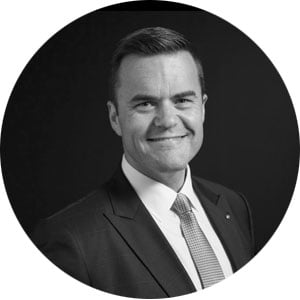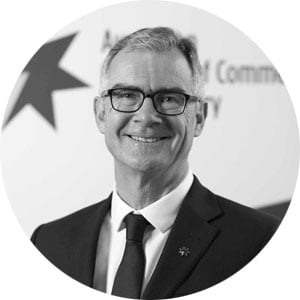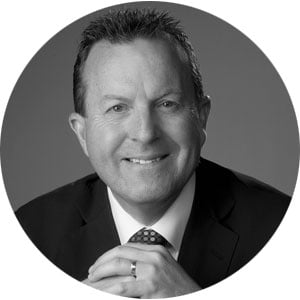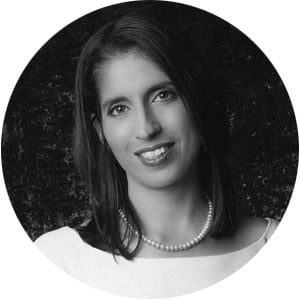The strength of an MBA program can be determined by its strong and current links to industry. In the Deakin MBA, students develop insider knowledge and industry connections through their relationships with our carefully selected industry adjunct professors.
The strength of an MBA program can be determined by its strong and current links to industry. In the Deakin MBA, students develop insider knowledge and industry connections through their relationships with our carefully selected industry adjunct professors.
According to MBA Course Director Associate Professor Colin Higgins, the industry adjunct professors offer a mix of workshops, live case-studies, and insight and input from their own organisations and experience. ‘We’re moving away from “lectures” to work with industry to unpack the big issues,’ he says. ‘We bring in these experts to illuminate what happening now – right now – in the business community.’
The industry adjuncts also have input into part of each core unit. ‘We sit down with them to scope out the meaningful “hot issues” occurring in their areas of expertise each year – so we can ensure we bring the latest issues in to the course content each year,’ Assoc. Prof. Higgins says.
Let’s meet a few industry adjunct professors who bring a wealth of expertise to the Deakin MBA.
#

Jo Fisher
Jo Fisher is the founding Partner and Managing Director of Fisher Leadership, a team of executive search and HR consultants specialising in socially positive sectors. Jo and her team develop scientifically based methodologies to enable more effective assessment, selection and development of successful leaders at all levels.
As an Australian committee member with the International Women's Forum and a former Telstra Business Women's Award Winner, Jo has long been recognised as a leading advocate for the importance of diversity in leadership.
A Deakin MBA graduate herself, Jo can speak directly to the experience of what the MBA can do for your career. 'I feel a strong part of my capacity for leadership in the executive search industry has come from the integration of academic insight with commercial solution building,' Jo says. 'I believe strongly that while knowledge is power, applied knowledge is pivotal.'
Jo believes that the learnings within the MBA need to be woven into on-the-ground experience and that applied knowledge is ultimately the most powerful factor in success. 'I am passionate about talking to students to discuss how they can benefit from an MBA,' she says. 'Both in more general terms, such as professional positioning and career transitioning, or more specifically about how the cohort might represent their qualification on a CV and in pitching their personal brand.'
Jo believes that Deakin University's MBA is one of the very best courses not only in Australia, but throughout the APAC region. 'Deakin has always led the way in future-facing initiatives, from technology to subject matter, to remote access, and to addressing students' whole of life and working world needs. The subjects offered in this MBA are pragmatic, real world and aligned with today’s business requirements.'
#

Andrew Conway
Andrew Conway, CEO of the Institute of Public Accountants, is a former Australian Government Treasury Ministry Chief of Staff and holds the record of being the youngest CEO of a public entity, appointed at just 28 years of age in 2009. Andrew has represented Australia at a range of international events including APEC, G20 and World Trade Organisation summits. Andrew's academic background and qualifications are in commerce, education and commercial law.
Andrew uses his blend of experience in government, international education and accounting practice when working with the students of the MBA. 'There are significant changes impacting business leaders of today and tomorrow,' Andrew explains. 'We need to build resilience whilst maintaining empathy and demonstrate authenticity at every junction.'
Andrew encourages emerging business leaders to realise that they only lead because people choose to follow them. 'Be clear in your vision for your organisation, communicate it often and insist on relying on insights over instinct,' he advises. 'Lean in to the challenges and dynamic nature of business, explore the potential and engage in broader issues to understand their impact.'
When sharing his experiences with MBA students, Andrews hopes to convey the breadth of opportunity in the business world. 'Working as an adjunct provides direct interface with emerging business leaders and enables me the unique opportunity to share my experience and tap into the emerging trends and challenges we face,' he says.
#

David Epstein
David Epstein is a Non-Executive Director, Consultant Public Affairs Adviser and Chair of Communications Compliance, the independent compliance monitoring body for the Australian telecommunications industry. He has a background in group public affairs, regulatory and communications functions at Qantas Airways, BHP Billiton and Optus (Singtel). He was also a senior adviser to three Australian Prime Ministers, culminating as Chief of Staff to Prime Minister the Hon Kevin Rudd.
In his role as an industry adjunct professor, David runs workshops for students both online and in-person. He finds that students gain a lot from these opportunities to share real-life examples about how organisations operate in a dynamic stakeholder environment. 'People respond to learning how to deal with individual dynamics of people you’re working with or trading with,' he says. 'That is a little bit unique, certainly in my experience.'
David encourages the students he works with to be mindful that business stakeholders come in a number of different forms. 'It's not just your managers and co-workers; there's people like regulators, public opinion, customers and you've got to think around your license to operate, what your brand really means and can you deliver the promise you’re making about your products and services,' David says. 'That's very important in today's world. It's a complex environment.'
David says he learns a lot from working with the MBA cohort. 'We draw on students' own experiences and pull them into the wider lessons.'
#

James Pearson
As CEO of the Australian Chamber of Commerce and Industry, James Pearson leads Australia's largest and most representative business network. He has held senior policy roles in Federal and State governments; led corporate affairs for large public companies; and supported his wife in their small family business. As a diplomat and trade negotiator, James represented Australia in Africa, the Pacific and China.
With his extensive contributions to public and government discussions around the issues impacting business and economics, James is uniquely placed to bring perspective-building conversations to the MBA students. 'We've discussed our experiences working within the Australian workplace relations system and shared views on how it makes some aspects of managing people much harder than they need to be,' he says.
With insights like these, MBA graduates are preparing for careers where they will be driving change. 'I hope our students benefit from a better understanding of the way that political decisions in Canberra impact their organisation’s ability to deliver on its strategy; and the importance of being politically active to influence those decisions,' James says.
James encourages MBA students to remember that they have been hired to be themselves rather than mimic someone else or follow a management technique that they read about in a textbook. 'We are always learning and practicing our skills, and applying what we learn to our circumstances but at the end of the day it is your unique combination of perspective, experience, feelings and skills that you are valued for,' he explains.
#

Chris Pearce
The Hon Chris Pearce is a Managing Partner, South East Asia at NGS Global and former Member of Parliament. He brings extensive political experience from his roles as Member for Aston in the House of Representatives, Parliamentary Secretary to the Treasurer and Shadow Minister for Financial Services, Superannuation and Corporate Law. Chris has served on commercial, government and not-for-profit boards and is currently Deputy Chairman and Non-Executive Director at the St Vincent's Institute of Medical Research.
As a graduate of the Deakin MBA, Chris brings a familiarity of the course to his work with the students. 'I know the course and I know what doing an MBA at Deakin is like,' he explains. Combining this insight with several decades of industry, business and political experience gives Chris added perspective: 'I think what I bring to the conversation is a viewpoint of realism and hardnosed practical experience that is very insightful in helping translate the theory into practice.'
Chris recalls a recent guest lecture he did around leadership and change management. 'What was interesting was I had feedback from students for weeks and weeks, wanting to get my viewpoint on different things,' he says. 'I found the students very proactive and very interested in the importance of leadership, change management and peak performance. I really enjoyed providing them with a set of tools that they could use to improve their own leadership.'
Chris says the Deakin MBA is an exemplary course because of its degree of industry focus and he encourages students to take advantage of this. 'My advice for students in the program is to leverage all interactions and opportunities they have to interface with industry partners and partner organisations,' he says. 'Embrace all opportunities of any interaction.'
#

Zivit Inbar
Dr Zivit Inbar is the founder and CEO of DifferenThinking, a consulting practice that specialises in people, culture and leadership. For over 17 years, Zivit has been helping technology companies, start-ups, and venture capitals, to build high-performance teams and create high-level strategies at the board and executive levels. Her work spans private and listed local and global organisations.
In her role as an adjunct professor, Zivit shares a unique array of case studies from her extensive professional career. 'I specialise in leadership in the innovation sector, so we normally have case studies, for example, mergers and acquisitions, restructuring, global expansion, these type of organisational changes,' she says.
Zivit encourages abstract thinking through real-life problem with the MBA students. 'There is a problem where corporates aren't innovating enough because of cultural legacy and they won’t be able to survive long-term if they can’t pick up tech, but they can't disrupt themselves,' Zivit explains. 'Start-ups are disrupting, but need to survive from corporate money. We play around with how corporate and start-ups can work better together.'
Another focus for Zivit's work with the MBA students is the exploration of ethics as they relate to currents issues. 'We had a trimester where we spoke a lot about ethical issues in NFP sector,' she says. Other topics have been the ethics of artificial intelligence and a recent royal commission. 'It depends what is in the news around ethical decision making at the board and executive level,' Zivit explains.
Zivit tries to impress on students that the MBA is not just about theory. 'It's not enough to sit and watch videos,' she says. 'The real advantage is solving case studies together, working with people from different disciplines, but at the same stage of your career, all growing together.'
Zivit says the benefits of networking and learning from one another cannot be underestimated. 'The cohort of today will be the executives of the future,' she says.
#
Keen to further your skills in business leadership? Find out more about the Deakin MBA
